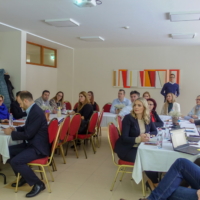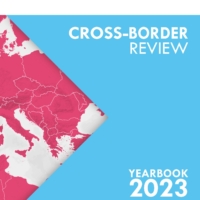We attended the ITEM annual conference
Knowledge sharing | 18 December 2023
Knowledge sharing | 18 December 2023
On November 17, 2023, the Maastricht-based ITEM held its annual conference in the Netherlands. In the framework of the day-long event organied in the South-Holland Provincial House in The Hague, legal and technical obstacles that traditionally stand in the way of cross-border cooperation were discussed, together with the possibilities of dismantling them, as well as the examination of the impact of certain development policies and sectoral policies on border areas.
In his opening speech, Jaap Smit, the Royal Commissioner of the province of South Netherlands, drew attention to the fact that in the midst of various geopolitical and global challenges (e.g. climate change, China-US competition, energy crisis), it is worthwhile to think about how Europe manages its exposure, how remains competitive, while it enforces the principles of sustainability and inclusion in the development policy.
Then Anouk Bollen-Vandenboorn, the director of ITEM, presented a study examining the expected cross-border impact of the lower house elections on November 22, 2023, which examined the programs of all 15 parties able to win seats in parliament regarding cross-border cooperation and the development of border regions according to their plans. Overall, it can be observed that the individual party programs pay little attention to border protection.
In the next block, the horizontal integration of neighboring countries was discussed, as well as what innovative EU policy would be needed for greater border cohesion. Martin Unfried, ITEM’s leading researcher, gave a presentation based on scientific foundations, in which he proposed the introduction of the concept of horizontal integration. According to this, in addition to vertical (hierarchical) integration between certain territorial levels, the horizontal dimension (between certain territorial units, between certain important actors of the same territorial level) is also important. He emphasised that “horizontal subsidiarity is needed: we are able to cooperate and develop better and more effectively within a cross-border region than if we were expecting it from the outside”.
According to Joachim Beck, rector of the Kehl University of Applied Sciences, the promotion of cross-border horizontal integration requires innovative tools. He emphasised the need for statistical data. The actors agreed that the transformation of the domestic legal system would be essential, since the project approach still prevails.
Loth van der Auwermeulen, a researcher at Hasselt University, also explained in his dissertation that the more countries participate in a regulatory cooperation, the less trust there is and the more relaxed the cooperation will be. Along the borders of the Netherlands, they are currently working on an agreement that would be able to solve the obstacles that arise in the case of infrastructure investments.
A separate round table dealt with the need for cross-border structures with regard to cross-border challenges, potentials and tasks to be performed. Jeanette Baljeu, deputy president of the province of South Netherlands, who is also the president of the Rhine-Alpine Corridor EGTC, emphasised that the EU’s mobility policy is increasingly paying attention to passenger transport. In cooperation with the Belgian presidency, Dutch politics has tried to promote legal accessibility in the field of transport.
Frans Weekers, Secretary General of the Benelux Union, explained that they worked on several conventions. On October 1, 2023, the parties signed an agreement on the topic of law enforcement. They agreed that regardless of nationality, police cars can continue their law enforcement activities on the other side of the border, and can drive across the border in certain cases. Dutch and Belgian (Flemish) regional officials have agreed to set up a permanent joint committee on legal harmonisation in the first half of 2024.
Sebastian Gröning-von Thüna, head of cross-border cooperation with France and the Benelux countries from the German Federal Ministry of Foreign Affairs, reported on regulatory cooperation along German borders. He highlighted the Aachen Convention promoting Franco-German cooperation, where regional politicians can forward the requests and expert opinions formulated in the border regions to the central governments and legislatures. It is an important experience that it is difficult to change existing legislation, which is why it is necessary to pay attention to the aspects of border regions when creating new legislation. He briefly outlined what legal accessibility initiatives have been formed in recent years with German participation.
The event also focused on specific cross-border and transnational infrastructure project plans, their possible (border) territorial effects, and the difficulties of implementation. The last session of the day dealt with cross-border social issues, in which the institute’s staff briefly presented ITEM’s 2023 publications on the topic.

 Cross-Border Review 2023
Cross-Border Review 2023